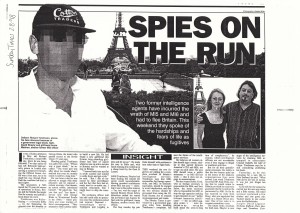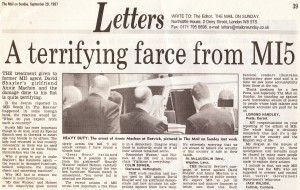Well, this story is interesting me extremely, and for the obvious as well as the perhaps more arcanely legal reasons.
Apparently a former senior MI5 officer is asking permission to give evidence to the Intelligence and Security Committee in Parliament about the Security Service’s collusion in the US torture programme that was the pyroclastic flow from the 9/11 attacks in 2001.
I have long speculated about how people with whom I used to work, socialise with, have dinner with in the 1990s might have evolved from idealistic young officers into people who could condone or even participate in the torture of other human beings once the war on terror was unleashed in the last decade.
During the 1990s MI5 absolutely did not condone the use of torture — not only for ethical reasons, but also because an older generation was still knocking around and they had seen in the civil war in Northern Ireland quite how counter-productive such practices were. Internment, secret courts, stress positions, sleep deprivation — all these policies acted as a recruiting sergeant for the Provisional IRA.
My generation — the first tasked with investigating the IRA in the UK and Al Qaeda globally — understood this. We were there to run intelligence operations, help gather evidence, and if possible put suspected malefactors on trial. Even then, when ethical boundaries were breached, many raised concerns and many resigned. A few of us even went public about our concerns.
But that is so much history. As I said above, I have always wondered how those I knew could have stayed silent once the intelligence gloves came off after 9/11 and MI5 was effectively shanghaied into following the brutish American over-reaction.
Now it appears that there were indeed doubters within, there was indeed a divided opinion. And now it appears that someone with seniority is trying to use what few channels exist for whistleblowers in the UK to rectify this.
In fact, my contemporaries who stayed on the inside would now be the senior officers, so I really wonder who this is — I hope an old friend!
No doubt they will have voiced their concerns over the years and no doubt they will have been told just to follow orders.
I have said publicly over many years that there should be a meaningful channel for those with ethical concerns to present evidence and have them properly investigated. In fact, I have even said that the Intelligence and Security Committee in Parliament should be that channel if — and it’s a big if — they can have real investigatory powers and can be trusted not just to brush evidence under the carpet and protect the spies’ reputation.
So this takes me to the arcane legalities I alluded to at the start. During the David Shayler whistleblowing trials (1997−2003) all the legal argument was around the fact that he could have taken his concerns to any crown servant — up to the ISC or his MP and down to and including the bobby on the beat — and he would not have breached the Official Secrets Act. That was the argument upon which he was convicted.
Yet at the same time the prosecution also successfully argued during his trial in 2002 in the Old Bailey that there was a “clear bright line” against disclosure to anyone outside MI5 — (Section 1(1) OSA (1989) — without that organisation’s prior written consent.
The new case rather proves the latter position — that someone with ethical concerns has to “ask permission” to give evidence to the “oversight body”.
Only in the UK.
Now, surely in this uncertain and allegedly terrorist-stricken world, we have never had greater need for a meaningful oversight body and meaningful reform to our intelligence agencies if they go off-beam. Only by learning via safe external ventilation, learning from mistakes, reforming and avoiding group-think, can they operate in a way that is proportionate in a democracy and best protects us all.


